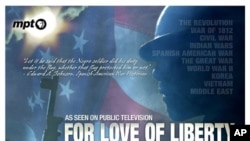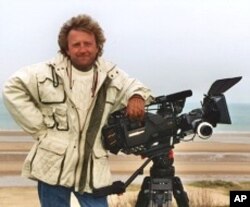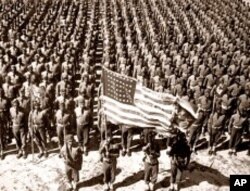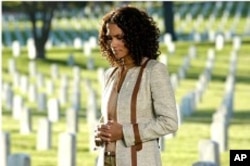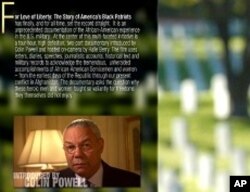A film called For Love of Liberty tells a little-known story of African Americans in the wartime military. The documentary aired this year on the US Public Broadcasting System, and a newly released CD features music from the film.
Director Frank Martin says most Americans know something about black units like the Tuskegee Airmen, African-American aviators noted for their heroics in World War II. He adds that most people are familiar with the 19th century black cavalry units known as Buffalo Soldiers. Both have been the subject of Hollywood movies.
But the filmmaker says African Americans played a prominent role as soldiers, sailors, airmen and Marines throughout the nation's history, and much of that story had not been told.
"Most folks have not a clue that there were 200,000 black men who fought in the Civil War, or had it not been for Louisiana's Free Men of Color, the British might well have won in the Battle of New Orleans. They have never heard of the First Rhode Island regiment who fought in the revolution," Martin said.
In fact, one of the first to die in the cause that became the American Revolution was an escaped black slave named Crispus Attucks, one of five American protesters shot by British soldiers in the Colonial Era Boston Massacre.
Martin has made films that explored various topics in the entertainment business. He has looked at the history of Metro-Goldwyn-Mayer Studios, for example, the life of director John Huston, and the history of sex and censorship in the movies.
He says he was attracted to the project about African Americans in the military because it posed a question.
"And the question is, why would someone shed their blood in defense of a nation that treated them worse than second-class citizens? Because the film is full of stories of, you know, black Marines during the Second World War in Louisiana who, the restaurants wouldn't serve them," explained Martin. "These guys were in uniform on their way to the Pacific. So it is an important question and it is a question that is relevant to all Americans, no matter what color you are."
The film tells the story through first-person accounts in letters and diaries, such as this vivid observation by Revolutionary War veteran James Roberts, read by actor Morgan Freeman.
"Human blood ran down in torrents, till the waters of the river were as red as crimson."
The film also tells its story through music, much of it composed especially for the project, and some dating to earlier eras, including the song Was My Brother in the Battle?
"This was written by Stephen Foster in the 1860s and it is a song about the Civil War," explained Martin. "Well, that song has never been sung by a black person. So when you hear that song, it instantly conjures up the Civil War. But when you apply a black voice to it, it takes on a whole different meaning."
Billie Holiday's somber ballad Strange Fruit recalls the summer of 1919, after the demobilization of the troops at the end of World War I and a shortage of jobs led to racial clashes. Scores of African Americans were lynched, especially in the South.
The documentary features notable African Americans, including Halle Berry and retired U.S. general Colin Powell.
"I was an American soldier for 35 years. I was a black American soldier," Powell said in the film. "And I followed in a long tradition of black men and women who have served this nation since long before our Revolutionary War."
Martin says the film answers the question that it poses at the beginning: why did these soldiers fight for a country that oppressed them?
"They fought for the love of liberty. They fought for freedom," he said. "They fought in the belief that if they fought harder, proved themselves braver, then they too would be worthy of the benefits that are prescribed in the Constitution, but that they did not enjoy."
Frank Martin says the film For Love of Liberty was 10 years in the making, but he says that was fortunate because it allowed the story to come full circle. By the time the film aired this year on the PBS network, the US military had its first African American commander-in-chief, President Barack Obama, something not imagined by earlier generations of black soldiers.
